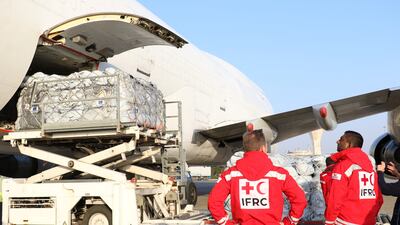Humanitarian aid being provided by Brussels for areas hit by last month’s earthquake could improve EU-Turkey relations, a senior official has said.
Janez Lenarcic, EU Commissioner for Crisis Management, on Wednesday told the European Parliament that the tragedy had offered an opportunity to "open a new page in our relations, in particular with Turkey".
He then made an apparent reference to longstanding political tensions between Greece, an EU member, and Turkey, with both countries also Nato members.
“For me personally, it was heartening to see, for instance, a large contingent of Greek search and rescue teams being there on day one helping with search and rescue effort,” Mr Lenarcic said.
Greece and Turkey have been at odds for decades over a number of issues, from territorial rights in the Aegean Sea to ethnically split Cyprus and migration.
But Greece was quick to send emergency teams and thousands of tents, beds and blankets after the February 6 earthquake and its aftershocks that have killed more than 50,000 people to date, across Turkey and Syria. Greece said it would send 80 tonnes of assistance to Turkey.
The neighbouring nations have a history of mutual aid in natural disasters. On February 12, Greek Foreign Minister Nikos Dendias was the first European foreign minister to visit Turkey after the disaster.
At the time, Turkish Foreign Affairs Minister Mevlut Cavusoglu recalled mutual aid when earthquakes struck both countries in 1999.
Greece was also among many European countries to send items such as shelter equipment, heaters, generators and food via the EU’s civil protection mechanism. The bloc has allocated a total of €5.5 million ($5.87 million) of EU humanitarian aid to respond to Turkey’s immediate needs.
Mr Lenarcic added he was “heartened” by EU aid to Syria, which was also badly affected by the earthquake but represented a more challenging state to support due to its continuing civil war and President Bashar Al Assad's grip on parts of the country.
Rescue groups operating in Syria have criticised the international community's slow response.
On Sunday, two UN planes landed in Damascus carrying EU humanitarian aid for earthquake survivors. The relief will be channelled to government-controlled areas of Syria via the International Federation of the Red Cross and Red Crescent — and in the non-government-controlled area of north-west Syria via the International Organisation for Migration, a UN official said.
The flights were the first in a series transporting assistance from the EU’s stockpiles in Italy and Dubai for Syrian people, the European Commission said.
The air bridge will deliver 420 tonnes of assistance to Syria.
This “clearly showed that the EU, in spite of its very firm policy towards the Assad regime, is ready and willing to help Syrian people when they need it”, said Mr Lenarcic.
The EU is set to hold a donor conference for Turkey and Syria on March 16.


